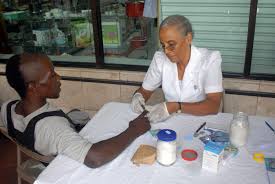Archive for June 2017
Fasting Blood Sugar Levels
 To test for diabetes or monitor a person’s diabetes, a physician orders a fasting blood sugar levels test.
To test for diabetes or monitor a person’s diabetes, a physician orders a fasting blood sugar levels test.
This test is done early in the morning before you eat anything, 8 to 12 hours after you have had your last meal of the day, without eating or drinking anything else other than water.
On average a person will have a blood sugar levels of 70 to 99 mg/dL.
If the level is above 100mg/dL, that is an indication of an impaired glucose metabolism.
The following are the factors that are known to affect blood sugar levels:
Food Intake
Foods that you eat within 8 hours to your test will most often elevate your fasting blood sugar levels. Once you eat and the food gets digested, it is normal for your blood to have higher levels of blood sugar for a while.
Alcoholic beverages, on the other hand, cause a drop in blood sugar levels, even when taken on the night before the test.
Medication
Some medication increases your blood sugar levels while others lower it. If you are under medications that include aspirin, certain antidepressants, birth control pills, anti seizure drugs, and even diuretics, will increase the sugar levels in your blood.
Other medications such as insulin, oral hypoglycemic agents, acetaminophen, blood sugar supplements, and anabolic steroids will lower your blood sugar levels.
Exercise
Exercise will either decrease or increase the levels of glucose in your blood. When a person exercises, insulin becomes more efficient and lowers the glucose levels in their blood. That effect lasts long after they have stopped exercising.
For example, a one-hour of exercising in the afternoon will have an effect on the blood sugar levels the next morning when you take the test.
Exercises can raise your blood sugar level temporarily by causing the release of adrenaline. The same goes other activities that cause excitement just before you take the test.
Physical Conditions
Some diseases and medical conditions will also have a profound effect on fasting blood sugar levels. These diseases and conditions include liver disease, thyroid gland disorders, and pancreas disorders.
A person who has undergone or experienced events such a major surgery, heart attack, injured in an automobile accident, or even suffered acute or severe trauma will have blood sugar levels that way above 100mg/dL, even when fasting.
Diabetes and Impaired Glucose Tolerance (IGT)
 Patients with diabetes or other glucose metabolism disorders experience elevated blood sugar levels even when fasting. Gestational diabetes is an abnormal glucose metabolism that pregnant women experience.
Patients with diabetes or other glucose metabolism disorders experience elevated blood sugar levels even when fasting. Gestational diabetes is an abnormal glucose metabolism that pregnant women experience.
Almost in all cases gets naturally resolved after giving birth.
According to the American Diabetes Association, if you have fasting blood sugar levels of 100 mg/dL to 125 mg/dL, then you might be having either Impaired Glucose Tolerance (IGT) or you are in pre-diabetes stages. For those with fasting blood sugar levels that exceed 125 mg/dL, that is an indication that they have diabetes.
Some methods can, however, be used to control diabetes and bring blood sugars down over time in a person who gets diagnosed with IGT or diabetes. They include weight loss, blood sugar supplements, proper diet, and exercises.
Cause of High Blood Sugar
High Blood Sugar (Hyperglycemia) Topic Guide – eMedicineHealth
www.emedicinehealth.com › … › high blood sugar hyperglycemia article
Whenever the glucose (sugar) level in one’s blood rises high temporarily, this condition is known as hyperglycemia. The opposite condition, low blood sugar, is called hypoglycemia.
Glucose comes from most foods, and the body uses other chemicals to create glucose in the liver and muscles. The blood carries glucose (blood sugar) to all the cells in the body. To carry glucose into the cells as an energy supply, cells need help from insulin. Insulin is a hormone made by the pancreas, an organ near the stomach.
The pancreas releases insulin into the blood, based upon the blood sugar level. Insulin helps move glucose from digested food into cells. Sometimes, the body stops making insulin (as in type 1 diabetes), or the insulin does not work properly (as in type 2 diabetes). In diabetic patients, glucose does not enter the cells sufficiently, thus staying in the blood and creating high blood sugar levels.
 Blood sugar levels can be measured in seconds by using a blood glucose meter, also known as a glucometer. A tiny drop of blood from the finger or forearm is placed on a test strip and inserted into the glucometer. The blood sugar (or glucose) level is displayed digitally within seconds.
Blood sugar levels can be measured in seconds by using a blood glucose meter, also known as a glucometer. A tiny drop of blood from the finger or forearm is placed on a test strip and inserted into the glucometer. The blood sugar (or glucose) level is displayed digitally within seconds.
Blood glucose levels vary widely throughout the day and night in people with diabetes. Ideally, blood glucose levels range from 90 to 130 mg/dL before meals, and below 180 mg/dL within 1 to 2 hours after a meal. Adolescents and adults with diabetes strive to keep their blood sugar levels within a controlled range, usually 80-150 mg/dL before meals. Doctors and diabetes health educators guide each patient to determine their optimal range of blood glucose control.
When blood sugar levels remain high for several hours, dehydration and more serious complications can develop. Moreover, even mild hyperglycemia (a fasting blood sugar over 109 mg/dL in adolescents/adults or over 100 mg/dL in children before puberty) – when unrecognized or inadequately treated for several years – can damage multiple tissues in the brain, kidneys, and arteries. When hyperglycemia is associated with the presence of ketones in the urine, this state demands immediate medical attention. When blood sugar levels rise and stay high (over 165 mg/dL consistently) for days to weeks, diabetes should be suspected and treatment initiated.
High blood sugar level fluctuations occur daily in people with diabetes. It is important to control blood sugar levels through diet, exercise, and medication (if prescribed), to know the symptoms of elevated blood sugar, and to seek treatment, when necessary.
What Causes High Blood Sugar And What Harm Can It Do To My …
abcnews.go.com/Health/DiabetesOverview/story?id=3843485
Diabetes is a condition where the glucose or sugar levels are too high in the blood. Now, there are many reasons why the blood sugar levels get too high in people with diabetes, but I will only mention the two main defects now.
The first is that the pancreas, which is an important endocrine organ in our bodies, does not secrete enough insulin. Insulin is the hormone that helps glucose go from the bloodstream into the cells of our body to be used for energy.
A complicated condition called insulin-resistance is the second main cause of diabetes. Insulin-resistance, which occurs primarily in type 2 diabetes, is when the cells of our body are resistant to the glucose-lowering effects of insulin. If an individual has either not enough insulin and/or insulin-resistance, then high blood sugar levels or diabetes will be present.
High blood sugar levels if untreated will cause short-term effects and long-term complications. High blood sugar levels over the short term do not cause any damage to the organs of your body, however they will cause you to feel tired and weak, be thirsty, and urinate a lot, be susceptible to infections and have blurry vision.
In fact in the elderly, high blood sugar levels can lead to dehydration, electrolyte imbalance, and lead to falls and of course we know getting a broken hip as an elderly individual can be pretty devastating.
Diabetes and Weight Loss
When it comes to weight loss and diabetes, for example, type 2 diabetes, you need to lower your blood sugar levels and lose extra pounds to improve your health.
It needs you to work closely with your diabetes educator or doctor. The reason is that your insulin, medications and blood  sugar need attention as you lose weight.
sugar need attention as you lose weight.
You get the following health benefits if you lose 10-15 pounds. They are:
- Lower blood pressure
- Lower blood sugar
- Improved cholesterol levels
- Less stress on, hips, ankles, feet and knees
- More energy
- Brighter moods
The Recommended Balance for Weight Loss and Diabetes
While you’re losing weight, you need to ensure you control your blood sugar levels. That’s because you don’t want to keep it high or low as you change your eating habits.
For someone with diabetes, it’s recommended that you cut 500 calories per day if you want to be safe. You can trim these calories from your fat, protein and carbohydrates intake.
The USDA recommends that adults’ calories should come from:
- 10%-35% protein
- 45%-55%carbs
- 25%35% fat
Carbohydrates affect your blood sugar in a big way if you have diabetes and want to lose weight.
Eating carbs that have fiber, for example, vegetables and whole grain bread, is much better that eating starchy or sugary carbs. The reason is that fiber raises your blood sugar gradually, which prevents it from crashing.
How Exercising Can Help You
Working out enables you to keep your blood sugar levels in balance. Another reason is that exercises help you to shed excess pounds.
Consult your doctor before starting to work out. The reason is that they need to know if you have any limitations.
 Consider getting at least 2.5 hours of workouts weekly. Activities such as brisk walking and moderate aerobic exercises can help to improve your health. You can divide these hours into short periods, for example, 30 minutes a day.
Consider getting at least 2.5 hours of workouts weekly. Activities such as brisk walking and moderate aerobic exercises can help to improve your health. You can divide these hours into short periods, for example, 30 minutes a day.
If you want to lose weight, you’ll need to carry out more workouts. Do strength training for at least two times a week. Consider using weight machines in your gym and your body weight by enjoying squats, push-ups and lunges or use hand weights.
Physical activities burn sugar stored in the liver, muscle and blood sugar. Watch your blood sugar levels carefully if you use diabetes medicines or insulin when you start exercising.
As you workout more regularly while keeping in touch with your doctor, you can be able to take lower doses of insulin and other medications.
Blood Sugar Is Affected By Different Types of Exercises
 Your blood sugar can be lowered immediately by aerobic exercises such as treadmill workouts or running.
Your blood sugar can be lowered immediately by aerobic exercises such as treadmill workouts or running.
Intense workouts or weight lifting for extended periods may affect your body’s blood sugar levels several hours later.
If you’re driving your car after these workouts, this result can be a problem. It’s one reason why you need to check your blood sugar before you start driving.
Consider carrying snacks such as juice, soda, crackers and fruits to consume after your workouts.
